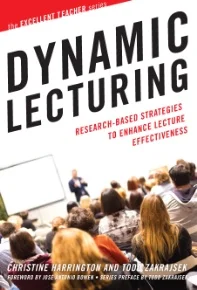There is a new series of books out there for teaching resources: "The Excellent Teacher Series." Two books of the series have been published already ("Dynamic Lecturing" and "Designing a Motivational Syllabus") and one coming out next year that I'm really looking forward to ("Understanding How We Learn").
Today a post about a book and how amazing it is!
First, let us say that this book series reviews traditional teaching methods in the light of peer-reviewed scientific evidence-based research (you got the idea, it's solid). With that being said, you might have heard of active learning/flipping the classroom and how lecture is just noneffective at teaching undergraduate students? Well, although this statement isn't completely wrong, it isn't completely true either!
Indeed, lecturing for long period of time is truly the worse, for everyone and most certainly for the students. However, peppering lectures with activities, prompts, questions, quizzes, etc. is enhancing lecture a lot. On the other hand, no lecture at all, beside being very challenging for the teacher, cannot always be done depending on the field, audience, and/or level. It is certainly easier to completely flip your classroom when dealing with 300 and above classes; but when we are talking about freshman classes that will lay the foundation of knowledge for the entire college experience ... that's another story, right?!
To be honest, I was a huge proponent of active learning at first and I rejected lecturing completely considering it as the easy way to teach ... boy was I young and stupid. I'm still very much in favor of active learning, but, as everything in life there is rarely a situation that can be rightly decided by flipping a switch or choosing sides: it depends on ... a lot of things! This book, "Dynamic Lecturing," opened my eyes on the necessity to integrate those new teaching methods (active learning/flipping the classroom) into our fundamental ways of teaching (lecturing). Moreover, they don't just say it, they prove it with evidences based on scientific research.
This book is also nicely structured.
First, it will (re)introduce you to what lecturing is and refresh your memory on the different types of lecturing (yes, this is also context dependent).
Then, with our bases covered, the biggest chunk is all about practical ways to use lectures to enhance learning in our students. I insist on the practical side of it: they give useful advice on how to implement each of the techniques they discuss as well as potential pitfalls to be aware of. Best of all, you know you are not implementing something so new that nobody knows its impact on students since the authors do a very good job at backing things up with scientific studies. You are literally standing on the shoulder of those giants and that's a great plus compare to running at their feet like in the intro of Lion King (go check it out and tell me if you'd rather be with the birds or on top of the elephant).
Finally, far from letting you try those new techniques without safety nets, the book provides you with ways to assess the effectiveness of your lectures. You will be given tools and advice to check on your students learning and on your teaching effectiveness.
To conclude, I cannot recommend this book enough to all my fellow teachers in college. It's cheap ($25), it's solid (evidence-based), it's packed with good information and doesn't waste your time (200 pp), and it will make you a better teacher ... what else can we want really?
